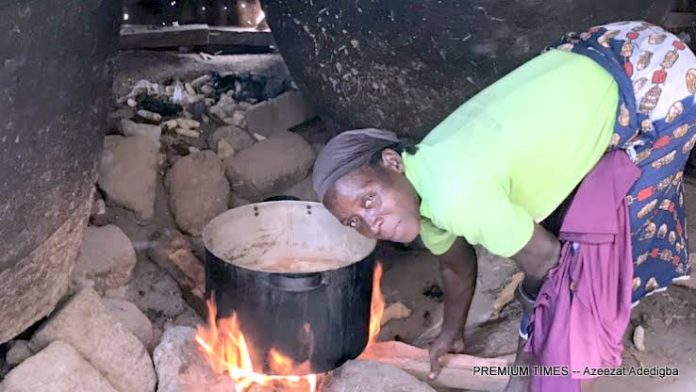News Investigators/ The Federal Government on Friday says it is working toward transiting one million households from firewood-based cooking to clean and sustainable energy solutions.
The Minister of Women Affairs, Imaan Sulaiman-Ibrahim, made this known during a citizen’s engagement news conference in commemoration of her 100 days in office in Abuja.
Mrs Sulaiman-Ibrahim said that this was part of efforts to promote gender-responsive climate action.
She said that Nigeria’s participation at COP29 in Azerbaijan provided a platform to engage with international community on gender-responsive climate action.
According to her, women are at the frontline of climate change impacts, and are ensuring that their voices, solutions, and leadership are integrated into climate adaptation and mitigation strategies.
“In this regard, we are working to transition one million households from firewood-based cooking to clean and sustainable energy solutions,” she said.
Mrs Sulaiman-Ibrahim said that the initiative was part of strategies to drive impactful reforms that would empower, protect and uplift the lives of women, girls and vulnerable populations.
She said that the ministry would empower 10 million women economically by 2027, ensuring that they played vital roles in Nigeria’s economic transformation.
“This aligns with President Bola Tinubu’s vision of a $1 trillion economy, where women are key contributors to national productivity,” the minister said.
She said that steps had been taken to achieve it by the commencement of the implementation of the World Bank supported ‘Nigeria for Women Scale-Up Project’, targeting 4.5 million women across the 36 states and the FCT.
Mrs Sulaiman-Ibrahim said that through financial literacy, business development, and cooperative structures, women would be equipped with tools to build sustainable enterprises and contribute meaningfully to economic growth.
She said that through the MOWA-SARA Accelerated Skills Acquisition Programme in collaboration with WEMA Bank, 500,000 women would be trained in vocational skills, business entrepreneurship, financial inclusion, among others.
“The first phase of the programme is currently underway in Kano State with 2,500 women being trained at the Ministry of Women Affairs Centre in Dederi and the Kano Hospitality & Tourism Institute in Gyadi-Gyadi.
“Also, to further strengthen access to finance, the ministry is working on setting up a National Microfinance Framework for Women Entrepreneurs.
“This initiative aims to bridge the financing gap for women, ensuring they have affordable credit, investment opportunities, and gender-responsive financial services.
“This will help them to grow their businesses and contribute more effectively to national development,” the minister said.
She said that food intervention programme for women and vulnerable groups had been unveiled for financial empowerment amidst economic hardships facing many families.
“By providing direct food assistance and supporting women-led agricultural initiatives, we are ensuring that no woman or child is left behind in our collective journey toward prosperity,” Sulaiman-Ibrahim said.
She said that the ministry also unveiled a nationwide campaign to provide menstrual hygiene kits to 10,000 young girls, thereby ensuring that they stay in school and maintain their dignity to end period poverty.
“My first 100 days in office have been marked by bold decisions, strategic partnerships and measurable impact.
“However, the work ahead is even greater and our commitment to transforming the lives of women and children remains resolute,” the minister said.
On her part, the Minister of State for Education, Suwaiba Sa’id-Ahmad, said that there was the need for women to seize the opportunities available to empower themselves and contribute to national development.
Mrs Said-Ahmad said that the Minister of Women Affairs had attained a great milage in meeting the aspirations of Nigerian women in just 100 days of her being in office.
“We have a lot of our girls that have not been opportuned to attend school for one reason or another, so we want to increase access to education by going to those communities that don’t have access.
“Early marriages, teenage pregnancy and emotional intelligence are some challenges facing the girl-child.
“We see the kind of passion the Honourable Minister of Women Affairs carries in her activities, so we know she is capable to tackle these challenges,” she said.
NAN


